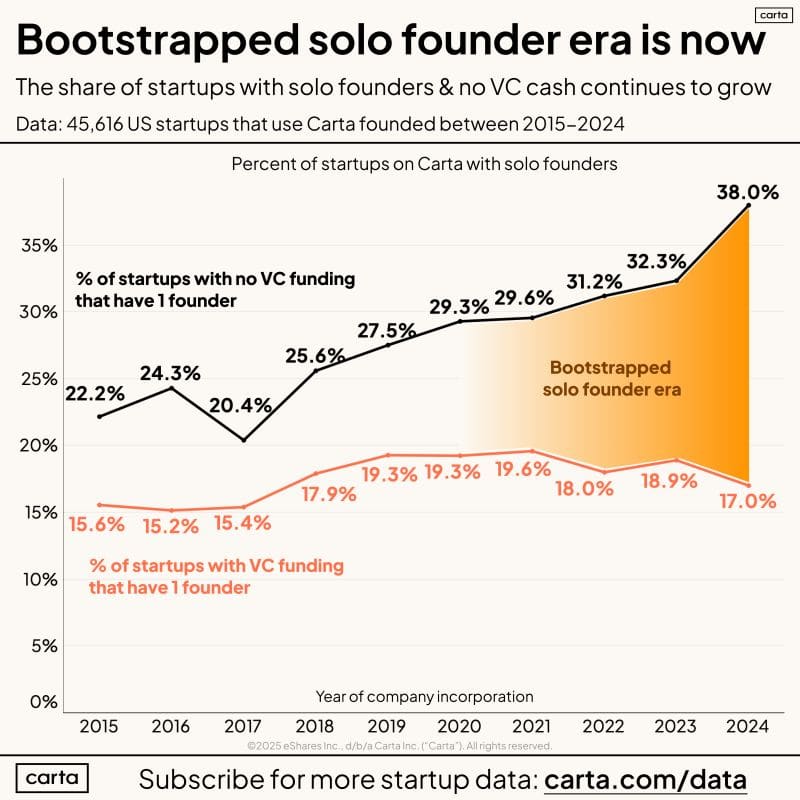
When thinking of billion-dollar companies, teams of co-founders often come to mind. However, several immensely successful ventures began as solo endeavors. One of the most famous examples is Amazon, founded by Jeff Bezos in 1994. Initially a one-person operation run out of his garage, Amazon grew to become one of the most valuable companies in the world.
Another shining example is eBay, founded by Pierre Omidyar. Omidyar single-handedly created the auction site that transformed how people buy and sell online. These stories show that while having co-founders can help share the burden, a single determined founder with a compelling vision can still build a groundbreaking enterprise.
Table of Contents
The AI-Multiplied Solo Founder
Solo founders face a unique challenge: they must be a jack-of-all-trades without the benefit of a co-founder’s diverse skill set.
However, a new generation of founders is leveraging AI to turn this challenge into a competitive advantage. AI tools can act as an entire team, automating everything from market research to data analysis.
By creating a systematic AI workflow, solo founders can validate ideas, build initial products, and even manage customer relationships with a level of speed and efficiency that was once only possible for large, well-funded teams.
This approach allows a single founder to achieve the same output as a traditional team, turning the idea of a “solo” venture into a powerful, AI-multiplied operation.
The Group for Solo Founders
Can You Get Into Y Combinator as a Solo Founder?
Y Combinator (YC) is known for producing some of the world’s most successful startups. Although most YC-backed companies have co-founding teams, solo founders can and do get accepted. YC values founder potential, product vision, and market understanding above all.
The challenge for solo founders lies in demonstrating that they can effectively handle the many responsibilities of growing a startup. YC often favors co-founders because they can share the intense workload and provide diverse perspectives under pressure. That said, a solo entrepreneur who proves exceptional ability, prior industry experience, and a clear plan to build a strong team can still secure a spot at YC.

Do Solo Founders Get Funded?
Securing venture capital as a solo founder can be more challenging than for a team, but it’s far from impossible. Data shows that while solo-founded startups are increasing overall, only about 16% to 19% of venture-backed companies have a single founder. Investors often hesitate because they see solo-led ventures as riskier. A sole founder must juggle strategy, execution, hiring, and fundraising without a co-founder to share the load.
However, solo founders who can demonstrate impressive traction, a deep understanding of their market, and a solid network often find investors willing to back them. The rise of accessible tools and platforms has also made bootstrapping a viable alternative. Many solo founders are choosing to forgo traditional VC funding, relying instead on revenue to scale their companies at a sustainable pace. By doing so, they retain full ownership and control of their vision.
Navigating VC Funding as a Solo Founder
So, can solo founders raise VC funds? The answer is yes—but it often requires extra clarity, grit, and narrative precision. Traditional VC firms may lean toward co-founding teams due to perceived risk reduction and team resilience, but that doesn’t mean solo entrepreneurs are excluded. A single founder who demonstrates clear traction, domain expertise, and a strong vision can still win over a venture capitalist or even a general partner at a top-tier venture capital firm.
In fact, solo founder startups can be particularly attractive to institutional investors when they maintain a higher degree of founder ownership, ensuring alignment between founder incentives and long-term value creation. The key is to make a compelling case that the startup founder can attract talent, build a capable startup team, and scale effectively with or without co-founders.
What Investors Look for in Single Founder Startups
For many venture capitalists, backing a solo entrepreneur hinges on evaluating the founder’s capacity to grow into a leader of a promising startup that can attract further VC funding. Venture capital funding isn’t just about the idea—it’s about the execution, and investors will want to see a roadmap for how the sole founder plans to scale, avoid founder burnout, and build a team that fills skill gaps.
While larger firms may lean conservative, smaller funds or early-stagefocused VCs are often more open to nontraditional setups. In fact, a growing number of female founders and solo startup founders are gaining traction, challenging the long-held assumption that only multiple founders can build a successful startup. For a VC firm, the decision comes down to the founder’s ability to de-risk the investment and demonstrate that a successful company can be built around their leadership, vision, and ability to execute.
Pros, Cons, and Common Objections
Pros:
- Complete Control: A solo founder can move quickly without needing consensus.
- Simplified Ownership: Equity and decision-making don’t need to be split.
- Unwavering Vision: The company’s direction remains clear and focused.
Cons:
- Heavier Workload: With no one to share the responsibilities, the founder bears all operational, strategic, and emotional burdens.
- Limited Skills: Co-founders often complement each other’s expertise. A solo founder must fill gaps by hiring early or learning quickly.
- More Difficult Funding Path: Many investors prefer teams, seeing them as more stable and less prone to burnout.
Common Objections from Investors:
- Burnout Risk: A single founder managing all aspects of a startup might become overwhelmed or exhausted.
- Lack of Diverse Perspectives: Without a co-founder to challenge ideas and provide alternative viewpoints, blind spots are more likely.
- Pacing Challenges: Scaling quickly can be tougher with one person leading every effort.
The Changing Landscape for Solo Founders
The barriers to starting a company continue to fall, especially as AI tools and no-code platforms make it easier to launch new ventures. Solo founders now have more resources to lean on, from online communities to accelerators and mentorship programs. The growing trend (Carta) of solo-founded startups—up from 17% in 2017 to 36% in 2024—shows that entrepreneurship is becoming increasingly accessible to individuals.
While it’s true that VCs remain cautious, the growth of alternative funding methods, like crowdfunding and revenue-based financing, offers new paths to success. For solo founders who are prepared to wear multiple hats, leverage modern tools, and adapt quickly, the future holds exciting possibilities.

Conclusion: Embrace Your Solo Journey
If you’re a solo founder—or considering becoming one—you’re not alone. Many entrepreneurs have built successful companies from the ground up, proving that with the right mindset, resources, and strategies, you can overcome challenges and thrive. The biggest game-changer today is leveraging AI to do the work of a co-founder. From automating lead follow-up to building entire revenue engines, AI and no-code tools are your secret weapon for scaling a company without a team.
Ready to build an AI-powered revenue engine?
Join our Founders Meeting, an interactive workshop where we’ll show you how to automate your go-to-market and save 10+ hours a week.



